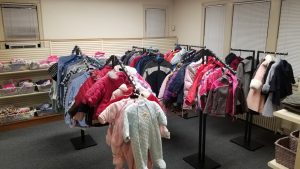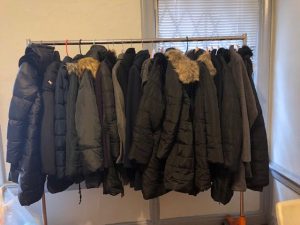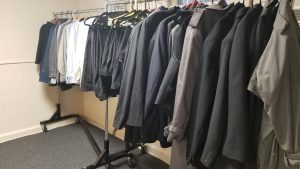Cloaked in Mitzvos What it Takes to Run a Winter Gemach
Walk into Riki Chanin’s basement and you will find 20 boys winter coats, 18 girls winter coats, and countless gloves and scarves. No, she is not a hoarder. She is the proud owner of a gemach, a charitable donation center that distributes free winter attire to anyone in need. For most, preparing for this brutal season involves a fun trip to the mall for a new coat and pair of boots, but for others the chill of poverty is too much to bear and they must manage without.
Riki Chanin of Crown Heights Gemach, Chana Labowski of Maternity Winter Coat Gemach, Tzippy Zager of Heater Gemach, and Mrs. Gold of Boro Park Clothing Gemach couldn’t stand to see children wearing winter coats that were clearly been passed down too many times, pregnant women trying to squeeze into coats two or three sizes too small, and others walking around without coats and living in cold dwellings. These remarkable women put their proverbial gloves on and got to work, opening gemachs to combat the challenges of the winter season.
It Started with a Pacifier
If you Google the word gemach, it will be defined as a Jewish free-loan fund. The word is an acronym for gemilus chasidim (acts of lovingkindness). The concept originates from the Torah prohibition of charging a fellow Jew interest on borrowed money: “You shall not give him your money for interest, nor may you give him your food for increase” (Vayikra 25:37). Jewish immigrants from Eastern Europe were the first ones to establish gemachs as interest-free money-lending fund organization. In fact, the Hebrew Loan Society of New York is the oldest gemach in America! It was established in 1892 by 11 members of the Lower East Side Jewish community. According to myjewishlearning.com, the modern concept of today’s gemachs, which have evolved and grew to include items (not just monetary loans) began in Israel with necessities that could not be accessed on Shabbos, items such as medicine or pacifiers. Israelis would borrow the item and then buy replacements after Shabbos to replenish the gemach. Rabbi Yisroel Meir Kagan, better known as the Chofetz Chaim, mainstreamed the idea of individuals opening a gemach (not communal) when he published his book Ahavat Chesed in 1888. The sefer not only answered many halachic questions relating to the business aspect of running a gemach, but also praised those that choose to start one of their own.
These days, there are gemachs for everything, and I do mean everything.
There are gemachs for magazines, cassettes, bris pillows, wedding shtick, tablecloths, laptops, medical equipment, baby supplies, toys, and furniture. There’s even a gemach for tree pruning and Shabbos chicken soup!
But sometimes it is the ordinary items that get neglected. As winter chills us with its icy blows, warm gear can be quite pricy. Boots, coats, scarves, gloves, and heaters don’t come cheap, and if you are blessed with a large family they can really freeze your finances.

Have Space, Have Heart
What motivated these people to open their homes and devote endless hours of unpaid work to running a gemach?
“I had the space and I saw the need,” explains Mrs. Gold, who decided to open her Boro Park clothing gemach after listening to a shiur about the obligation to treat clothing with respect.
Riki Chanin opened Crown Heights Coat Gemach three years ago after she and her husband observed kids walking around the neighborhood with ripped and torn coats. When she spread the word, people began sending her bags of coats which she houses in her unfinished basement.
Riki feels bad that recipients must come to her basement to try on coats. She wishes she could present them with a nicer environment. She currently has a Go Fund Me page which she hopes will allow her to remodel.
But not everyone has the space. Chana Labowski of Maternity Winter Coats does not have a vacant basement, but what she does have is a dining room. “The coats take up a lot of space and at times they were in my dining room on racks. It’s funny to see people’s reactions when they come to visit and think all the coats belong to us,” she says. In the summer, she packs up all the coats and put them storage until autumn.
Chana opened her gemach after discovering how difficult it was to find an inexpensive maternity coat. “It dawned on me,” she says, “that if it was hard for me to find a maternity coat, others are probably in the same boat.” Chana always wished to open a gemach in memory of her grandparents Tikvah and Yekusiel Broh, a”h, and so Maternity Coat Gemach was born, allowing pregnant women to borrow warm and stylish coats. Chana takes pride in her stock of beautiful coats, which number in the 40s.

Heat it Up
Winter is not only brutal on the body, but on homes as well.
“You never know who needs heat in the winter,” says one of the owners of Lakewood Heater, who wishes to remain anonymous. This gemach was started two years ago by a sweet newlywed couple who store their portable heaters, as well as radiators, humidifiers, and air conditioners in their basement apartment. They agree that it can be challenging to store some of this machinery in their tight quarters, but say they somehow seem to manage and “make the space.”
The owner received a call recently from a family who rented a simple hall for their son’s bar mitzvah. The hall was not equipped with adequate heat, so Lakewood Heater Gemach hooked them up with space heaters so their guests could be comfortable at the simchah. For no charge, and no deposit, Lakewood Heater Gemach allows those in need to borrow their heaters for a week or more. Since they began their gemach, which the owner stresses is not “a business, just something we wanted to do to be nice,” there have been no incidents of unreturned or damaged heaters.
Tzippy Zager distributes heaters from her Flatbush home. She inherited the gemach when its owner moved to Lakewood more than a decade ago. Tzippy’s gemach requires a $25 deposit and allows recipients to borrow one of her eight heaters for two weeks. It is intended to function only as an emergency chessed for those who need heat for short periods. Tzippy wishes she could lend out the heaters for longer, but she says that gemachs need to enforce their rules to stay alive and continue helping others. “I feel terrible when I need to take back the heaters,” she says, “but then I have to remind myself that if I allow people to keep them for months, others will be turned away and then they will have no heat. Is that fair?”
Working 9-5?
The hours might be unconventional and the pay non-existent, but the dividends never stop growing. “Believe it or not, running a gemach isn’t as hard as one might think,” says Mrs. Gold, who saves a lot of time and stress by allowing recipients to pick up, drop off, and try on coats on their own, whenever they want. She admits that this perhaps isn’t the best system and plans to implement more specific guidelines when she reopens.
Tzippy feels that gemachs should create mission statements much like business do to avoid being overwhelmed. “Gemachs are designed to be a rotation of chessed, so more people can benefit from the goods which are being recycled. There need to be clear guidelines. If you are allowing people to keep the item, then say that.” she explains. Tzippy never cashes the $25 deposit or charges people for returning damaged heaters. She got her instructions from reading the Chofetz Chaim’s Ahavas Chesed which encourages gemach owners to run it like business, take collateral, and establish rules.
Running a coat gemach is almost like running a cleaners. Coats must be laundered, dusted, repaired, inspected for missing parts, and stored properly.
Riki says she has about 100 coats in her stockpile and gives away on average anywhere from 30 to 50 coats a season. Although her gemach is only operational during the fall and winter months, it is still a year-round job that includes sorting through piles of coats that are dropped off at her basement. She devotes a few hours a week to inspecting each coat for quality. Those coats that don’t make the cut are dropped off in the Chessed Center vans.
While some coats must be dry cleaned professionally, Chana tries to cut costs by washing others in her home machine. “It’s also a task to follow up on returns when coats aren’t needed anymore,” she says. “What takes up most of my time is setting up appointments and waiting on the person. Chana has between one and six appointments each week, “I try my best to be flexible because I know how it is to be a wife and mother, baruch Hashem.” Each appointment takes about 30 minutes. “It’s my absolute pleasure to help women find the perfect coat and give them all the time they need,” she explains, “but it would help if people would let me know if they need to cancel an appointment. I totally understand when things come up last minute, so a quick text or something would make any gemach run more smoothly.”
Tzippy want those who wish to drop off or pick up items to respect the owner’s guidelines and policies. “We all have busy lives, and it is hard for us to keep track of who took which items and when are they due back, “ she says. “If an item broke, be honest about it so I can have it repaired or replaced for the next recipient. We are not trying to be mean; the opposite is true. By enforcing the rules, we can continue to help others.”

Gemach Inventory
Where does one get a hold of hundreds of coats, scarves, and gloves?
Chana and her husband purchase most of the coats for Maternity Coat Gemach, while a few others were sponsored by family members or donated by others. Contrary to common belief, most gemachs do not offer outdated or rejected clothes. Great care is taken to make sure that all the coats are clean, current in style, and in good condition.
Mrs. Gold’s gemach got so big that enlisted the help of Bais Yaakov high school girls during their mandatory chessed hours. This winter she is taking a break from the gemach so she can focus on her daughter’s upcoming wedding, but she hopes to return to the enriching “business” of giving away free coats as it has given her much nachas.
“I think some women feel a little uncomfortable visiting a gemach. I thank each woman that comes because truly there’s so much joy in giving. The coats we purchased are of great quality, warm, and pretty. I want each woman to feel wonderful. When they can feel warm and like how they look, it makes all this effort worthwhile!” says Chana.
This winter a family that is going through hard times came to Crown Heights Gemach. The husband is unemployed and currently on disability, all five kids have various issues ranging from ADHD to Down’s Syndrome. At the end of the appointment, Riki was able to successfully able to match all members of the family with winter coats. The feeling she got watching them exit her gemach, as she puts it, was “indescribable.”
You must be logged in to post a comment.